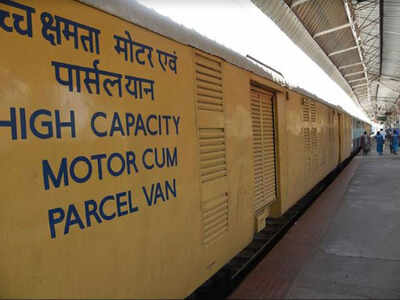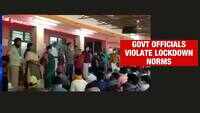
CHANDIGARH: Re-launched after four decades because air, road, and sea routes are closed during Covid-19 pandemic, railways' special parcel service is still a long way from being clients' favourite.
North region's industrialists say that while private couriers offer pick up and drop between station and factory in these times of labour shortage, the railways don't. There is no live tracking system and misplaced shipment isn't railway’s responsibility, even in case of important supplies. Farmers aren't sure if the service will continue after the lockdown. It will be hard for them to shift from road to rail and back to road.
One of the medicine suppliers of Chandigarh said on the condition of anonymity that: "Amid so many production difficulties, manufacturers want at least a hassle-free delivery service, which the railways isn’t able to provide. The railways’ lost my parcel and failed to recover it even after reminders. I had to bear a major loss. They don’t even have a 24-hour customer care desk."
Vegetable and fruit supplier Tirath Anand Bhardwaj of Solan mandi in Himachal Pradesh said: "Farmers can’t risk shipping perishable items by these trains that had a reputation for running late. There is going to be a huge demand for garlic next month in Mumbai and Kerala but we will transport it by trucks instead of trains. If the railways wants business, it must speed up."

Confronted, Ambala senior divisional commercial manager Hari Mohan said: "We have written to the Himachal Pardesh secretary to see if he can ask the medicine makers of Baddi and Parwanoo, besides horticulturists and farmers, to use the special parcel van. The parcel cargo vans are underutilised, even though we don’t charge the industry for extra time they take in loading—a concession for labour shortage."
He hoped that relaxed local curbs will bring in more customers. Only food and drink multinational Nestle uses this service four times a day, while the division is in talks with other companies as well. The Kalka special parcel van will get fruit and vegetable cargo till October once the plucking season starts in May.
Accepting that labour transhipment was a constraint that kept the parcel service less popular, Hari Mohan said: “In the commercial control room, a nodal officer and an inspector listen to the calls from clients and give feedback to higher authorities for action. Meanwhile, there’s good news. Ambala division’s bulk cargo earnings of Rs 50 lakh for March 30 to April 25 are highest in northern railway.” Ferozepur divisional railway manager Rajesh Aggarwal said finding men to bring cargo to the station remained difficult for both farmers and industry.
North region's industrialists say that while private couriers offer pick up and drop between station and factory in these times of labour shortage, the railways don't. There is no live tracking system and misplaced shipment isn't railway’s responsibility, even in case of important supplies. Farmers aren't sure if the service will continue after the lockdown. It will be hard for them to shift from road to rail and back to road.
One of the medicine suppliers of Chandigarh said on the condition of anonymity that: "Amid so many production difficulties, manufacturers want at least a hassle-free delivery service, which the railways isn’t able to provide. The railways’ lost my parcel and failed to recover it even after reminders. I had to bear a major loss. They don’t even have a 24-hour customer care desk."
Vegetable and fruit supplier Tirath Anand Bhardwaj of Solan mandi in Himachal Pradesh said: "Farmers can’t risk shipping perishable items by these trains that had a reputation for running late. There is going to be a huge demand for garlic next month in Mumbai and Kerala but we will transport it by trucks instead of trains. If the railways wants business, it must speed up."

Confronted, Ambala senior divisional commercial manager Hari Mohan said: "We have written to the Himachal Pardesh secretary to see if he can ask the medicine makers of Baddi and Parwanoo, besides horticulturists and farmers, to use the special parcel van. The parcel cargo vans are underutilised, even though we don’t charge the industry for extra time they take in loading—a concession for labour shortage."
He hoped that relaxed local curbs will bring in more customers. Only food and drink multinational Nestle uses this service four times a day, while the division is in talks with other companies as well. The Kalka special parcel van will get fruit and vegetable cargo till October once the plucking season starts in May.
Accepting that labour transhipment was a constraint that kept the parcel service less popular, Hari Mohan said: “In the commercial control room, a nodal officer and an inspector listen to the calls from clients and give feedback to higher authorities for action. Meanwhile, there’s good news. Ambala division’s bulk cargo earnings of Rs 50 lakh for March 30 to April 25 are highest in northern railway.” Ferozepur divisional railway manager Rajesh Aggarwal said finding men to bring cargo to the station remained difficult for both farmers and industry.

Coronavirus outbreak
Trending Topics
LATEST VIDEOS
City
 Indian Army Chief Manoj Mukund Naravane gives stern warning to Pakistan
Indian Army Chief Manoj Mukund Naravane gives stern warning to Pakistan  On cam: Govt officials violate lockdown norms in Kerala's Kannur while addressing migrant workers
On cam: Govt officials violate lockdown norms in Kerala's Kannur while addressing migrant workers  Covid-19 crisis: Muslim man in Hyderabad distributes food packets among needy across faiths
Covid-19 crisis: Muslim man in Hyderabad distributes food packets among needy across faiths  Covid-19 crisis: Kerala, Rajasthan and Maharashtra make migrants pay for their travel
Covid-19 crisis: Kerala, Rajasthan and Maharashtra make migrants pay for their travel
More from TOI
Navbharat Times
Featured Today in Travel
Quick Links
Kerala Coronavirus Helpline NumberHaryana Coronavirus Helpline NumberUP Coronavirus Helpline NumberBareilly NewsBhopal NewsCoronavirus in DelhiCoronavirus in HyderabadCoronavirus in IndiaCoronavirus symptomsCoronavirusRajasthan Coronavirus Helpline NumberAditya ThackerayShiv SenaFire in MumbaiAP Coronavirus Helpline NumberArvind KejriwalJammu Kashmir Coronavirus Helpline NumberSrinagar encounter
Get the app





